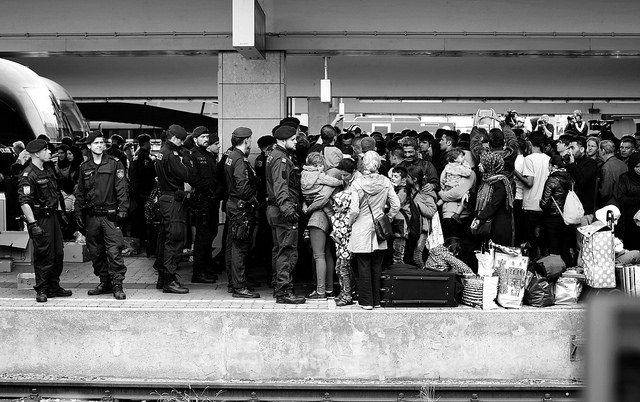 Originally published 11 September 2015. Picked by Patrick Walters and Natalie Sambhi.
Originally published 11 September 2015. Picked by Patrick Walters and Natalie Sambhi.
‘Things are seldom what they seem’—so wrote the librettist W.S. Gilbert in
HMS Pinafore. The current refugee crisis in Europe looks like a humanitarian tragedy on a large scale, the biggest in Europe since WWII. It is. But, more than that, it’s a strategic crisis with profound implications for Europe, the Middle East and the rest of the world.
One of the clearest examples of the law of unintended consequences was the generation of refugee flows from Iraq and Afghanistan in the wake of the decision by the Bush administration to sanction the 9/11 bombings by destroying Saddam Hussein’s government in Iraq and denying al Qaeda use of Afghanistan as a terrorist training ground. As Israel has found to its cost, refugee flows have strategic effects. This is equally true of the growing refugee flows from Iraq, Afghanistan and Syria, not to mention the refugee crisis in North Africa and Yemen.
Just as the vast movement of peoples in the first millennium of the Christian era destabilized the empires of Rome and China, so too the mass migration of people from the Middle East may have long-term strategic effects. There are four that are worth considering.
First, throughout history, among the quickest to flee civil wars are the educated and mercantile classes, taking with them the skills and human resources, not to mention substantial financial assets. Such assets are necessary for the economic reconstruction that is essential to precipitate the restoration of political and social stability. The stories currently being told by Syrian refugees as they arrive in Austria and Germany—often in well-spoken English and French—suggest that the wish for a new life doesn’t contemplate a return home.
Second, at least in the short term, the arrival of hundreds of thousands of refugees imposes enormous economic and social strains on the receiving countries. Jordan, Lebanon and Turkey, are struggling to accommodate millions of desperate people; it’s a struggle made even more difficult by the near-bankruptcy of the principal UN agencies. Indeed, the same problems currently confront Pakistan, with its 1.5 million registered Afghan refugees.
Third, the long-term integration of very large numbers of refugees in receiving countries can generate substantial social and political problems for both the new arrivals and the long-established residents. The rise of the radical right and Islamic terrorist cells in both Britain and France has as much to do with the difficulties of integration as it does with racism and xenophobia. Closer to home, one has only to look at the consequences of Indonesia’s
transmigrasi program relocating impoverished Javanese in Kalimantan and West Papua to see how political instability and violence is the inevitable result.
And finally, the translation of historic grievances to distant countries can fuel instability in both the departing and receiving nations for generations. In traditional strategic analysis, warning has three key vectors: extant military capability, the time taken to acquire new military capability, and motivation. Of these three, motivation is the sleeper—something the UK discovered in the lead-up to the Falklands War.
As Australia continues its inexorable slide down the list of wealthy nations (we are currently in the second eleven, and headed for the third eleven within the next two decades), we’ll find that military strength as a means of reinforcing our global authority and influence will increasingly become a sign of impotence instead of power—if it hasn’t become so already.
Good strategy involves moving early to secure long-term advantage. Australia’s future security will be significantly more dependent on a strong rules-based international system and sound regional economic arrangements than on military partnerships, useful though they might be in the short term.
At a time when the UN is deeply stressed and its agencies unable to cope with current refugee, health and food pressures, Australia and like-minded countries would be acting in their long-term best interests by supporting a concerted program of reform and evolution. Short of a major world cataclysm of the kind Philip Bobbitt chronicles in
The Shield of Achilles, quick and dramatic reform of the UN is unlikely. But concerted pressure from its membership could lead to the kinds of changes to the structure of the UN Security Council and other agencies that are evidently needed.
As the present global refugee crisis is demonstrating on a daily basis, tokenism and symbolic gestures are the immediate resort of governments—except Angela Merkel’s. The refugees heading towards Europe are numbered in the hundreds of thousands, and millions are already living in impossible conditions in camps across the Middle East—not to mention over 7 million people displaced within Syria itself. Resettlement programs in the thousands are nothing more than vain gestures.
For Australia, there are precedents. Phil Orchard reminded us in his
recent post here on The Strategist that the 1989 Comprehensive Plan of Action addressed the Indo-Chinese refugee problem. More recently, Prime Minister Howard’s
$1 billion response to the Boxing Day tsunami of 2004 was both immediate and generous.
At a time when Australia is spending over
$1 billion per year to keep refugees locked up on Nauru and Manus Island, and
$50 million to resettle just four former refugees in Cambodia, the government’s pledge of
$44 million looks paltry. A donation of $1 billion to the UNHCR, together with concerted diplomatic action with like-minded countries to address the global refugee problem systematically, would be an initiative in our own long-term strategic interest.
So far, Australia’s response to the current refugee crisis has been confused, slow, small and unconfident. As Gilbert’s patter-song continued, ‘Gild the farthing if you will, yet it is a farthing still’. This is a case where strategic leadership would also serve the government’s interests well.
 Print This Post
Print This Post